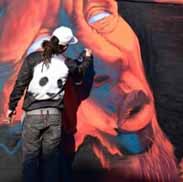History- Chapter 5 Lesson 3 – Flashcards
Unlock all answers in this set
Unlock answersquestion
militia
answer
a group of civilians trained to fight in emergencies.
question
minutemen
answer
companies of civilian soldiers who boasted that they were ready to fight on a minute's notice.
question
approached
answer
move closer to.
question
volunteers
answer
willingly step foward
question
loyalists
answer
american colonists who remained loyal to British and opposed the war for Independence.
question
patriots
answer
american colonists who favored American Independence.
question
1. What brought about the clash between American colonists and British soldiers at Lexington and Concord?
answer
Americans were arming themselves and expected an armed confrontation with British troops. The British gone to the American on excuse to confront them when British soldiers were ordered in march to Concord and seize artillery and weapons.
question
2. What was the Continental Congress and what was its purpose.
answer
The Continental Congress was a political body establishment to represent American interests and challenge British laws and control.
question
3. Who are John Adams, John Jay, George Washington, and Paul Revere?
answer
John Adams- Samuel Adams' cousin, a lawyer from Massachusetts, member of Continental Congress. John Jay- Lawyer from New York member of the Continental Congress. George Washington- leader of Revolutionary Army, member of the Continental Congress from Virginia. Paul Revere- member of the Sons of Liberty rode to warn Adams and Hancock the British were coming, was captured by the British.
question
4. Who were the 3 men that were part of alerting the colonists? Describe their ride.
answer
John Hancock, William Doves, and Dr. Samuel Prescott. Paul Revere left Boston heading to Lexington, but Revere was captured and Dr. Samuel Prescott rode the rest of the way in his place. William Doves left Boston and when Revere was captured he turned around and headed back.
question
5. Where did the British victory occur? Where did the colonial victory occur? Use map on page 134.
answer
Lexington. The North Bridge on Concord.
question
6. What tactics did the colonists use against the British troops on their march back from Concord to Boston?
answer
The colonists hid behind fences and trees, firing upon the British form their hiding places.
question
7. Reread Patrick Henry's quote about the Continental Congress. What change was occurring in the way the colonists saw them.
answer
Colonists were beginning to view themselves as citizens of one nation, rather than citizens of individual colonies, and entitled to freedom from British rule. They believed that if they could not be "free"; they would prefer death.
question
8. Describe the similarities and differences between Patriots and Loyalists.
answer
Differences: Loyalists did not consider taxes a reason for rebellion; often lived in isolation; expected the British to win the war. Similarities: Both believed taxes and regulations were unfair. Differences: Patriots believed British rule was unbearable and that the colonies could win their independence.
question
9. Briefly describe the Battle of Bunker Hill.
answer
On June 16, 1775, the militiamen set up at Bunker Hill and nearby Breed's Hill. The British charged up Breed's Hill, but were forced back. The British charged 2 more times until the colonists ran out of gunpowder and withdrew. The British won the battle but suffered heavy losses.
question
10. What did the British learn from the Battle of Bunker Hill?
answer
They learned that defeating the Americans on the battlefield would not be quick or easy.



